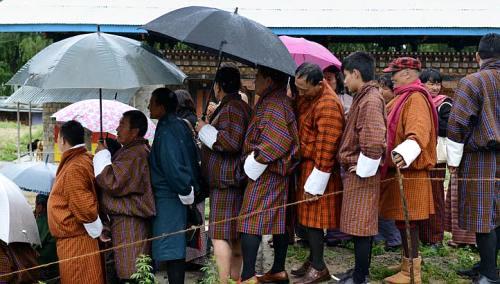Ammon News - (Al Jazeera) - Bhutan's opposition People's Democratic Party (PDP) has scored an upset victory in the second parliamentary elections, and will take over power in the tiny Himalayan nation.
The official website of Bhutan's Election Commission says the PDP won 32 seats in the 47-member national assembly in Saturday's voting, while the ruling Druk Phuensum Tshogpa or Peace and Prosperity Party (DPT) managed only 15 seats.
Chief Election Commissioner Kunzang Wangdi said official results would be announced on Sunday.
The winning party needed 24 out of 47 seats up for grabs to form the next government in the Himalayan nation after two other parties were knocked out in a primary voting round in May.
The polling marked only the second time in history that voters in the isolated kingdom, dubbed as the "land of the thunder dragon", have elected a government.
Remote Bhutan's line of "dragon kings" ceded absolute power five years ago, introducing democracy to an electorate of fewer than 400,000 people.
The royalist DPT won the first election by a landslide in 2008 and bagged this year's primary round with 45 percent of votes.
But recent gains by the PDP shook up the contest.
The DPT had sought to win favour with rural communities - about 70 percent of the population - by improving their access to roads, mobile phone networks and electricity in the past five years.
Rising fuel prices
The election process was stirred up by a recent straining of ties with Bhutan's giant neighbour and longtime ally India, which suddenly cut subsidies earlier this month on cooking gas and kerosene to the kingdom.
The rising fuel prices come as Bhutan has been struggling under a credit crunch and import restrictions, after running out of Indian rupee supplies last year on soaring demand.
Casting votes was a huge logistical challenge across the mountainous country, with officials trekking for up to seven days to set up polling stations.
Bhutan is the only country in the world to pursue "Gross National Happiness", a development model that balances spiritual and mental wellbeing with financial growth.
It was the last country in the world to allow television in 1999, and high visitor fees aim to keep out mass tourism to shield the country's natural beauty and Buddhist culture.
Another policy that sets the country apart is its goal to make its farming 100 percent organic.
In April, Bhutan voted for 20 elected seats in the National Council, the upper house of parliament whose members have no party affiliation and monitor the government's actions, review legislation and advise the king.
Party leaders kicked off the election season in early May with a televised debate.
